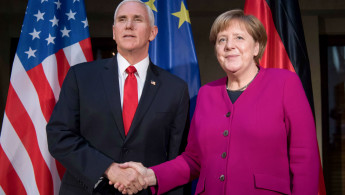US and Germany clash over Iran deal and Syria
German Chancellor Angela Merkel and US vice-President Mike Pence have clashed at a security conference in Munich.
2 min read
Pence and Merkel disagree on key Middle East issues [Getty]
German Chancellor Angela Merkel has defended a nuclear deal with Iran during a showdown with US vice-President Mike Pence at a security conference in her country.
Merkel, a key supporter of the multinational nuclear deal with Iran, used to opportunity at the Munich conference with Pence to voice her dismay at Washington's decision to leave the accord.
She said that President Donald Trump's announcement last year that the US was leaving the nuclear agreement with Iran - and reinstating sanctions on Tehran - "depresses me very much".
"I see the [Iran's] ballistic missile programme, I see Iran in Yemen and above all I see Iran in Syria," she said.
"The only question that stands between us on this issue is, do we help our common cause, our common aim of containing the damaging or difficult development of Iran, by withdrawing from the one remaining agreement? Or do we help it more by keeping the small anchor we have in order maybe to exert pressure in other areas?" she told the security conference.
Pence also used the opportunity to tell allies and foes alike that the threat from Iran cannot be ignored, accusing Tehran of being "the leading state sponsor of terrorism in the world".
"The time has come for our European partners to stop undermining US sanctions against this murderous revolutionary regime," Pence said.
"The time has come for our European partners to stand with us and with the Iranian people, our allies and friends in the region. The time has come for our European partners to withdraw from the Iran nuclear deal."
Germany has among the strongest proponents of the nuclear deal and called on Washington to get back behind the negotiating table with Iran.
Merkel has argued that the deal offered the only opportunity to curb Tehran's ambitions and prevent a war breaking out between Iran and its neighbours.
Merkel, a key supporter of the multinational nuclear deal with Iran, used to opportunity at the Munich conference with Pence to voice her dismay at Washington's decision to leave the accord.
She said that President Donald Trump's announcement last year that the US was leaving the nuclear agreement with Iran - and reinstating sanctions on Tehran - "depresses me very much".
"I see the [Iran's] ballistic missile programme, I see Iran in Yemen and above all I see Iran in Syria," she said.
"The only question that stands between us on this issue is, do we help our common cause, our common aim of containing the damaging or difficult development of Iran, by withdrawing from the one remaining agreement? Or do we help it more by keeping the small anchor we have in order maybe to exert pressure in other areas?" she told the security conference.
Pence also used the opportunity to tell allies and foes alike that the threat from Iran cannot be ignored, accusing Tehran of being "the leading state sponsor of terrorism in the world".
"The time has come for our European partners to stop undermining US sanctions against this murderous revolutionary regime," Pence said.
"The time has come for our European partners to stand with us and with the Iranian people, our allies and friends in the region. The time has come for our European partners to withdraw from the Iran nuclear deal."
Germany has among the strongest proponents of the nuclear deal and called on Washington to get back behind the negotiating table with Iran.
Merkel has argued that the deal offered the only opportunity to curb Tehran's ambitions and prevent a war breaking out between Iran and its neighbours.
The US has cited Iran's missile programme, support of "terrorist groups", and its expansionism in the region as factors in ending its participation in the accord.
The deal was struck between the US, world powers and Iran in 2015 with the aim of regulating Tehran's nuclear programme.
Merkel also urged the US not to pull its troops out of Syria, where the defeat of the Islamic State group on the battlefield appears close to completion, but with the jihadis still posing a major insurgency threat, according to security experts.
"Is it a good idea for the Americans to suddenly and quickly withdraw from Syria? Or will it once more strengthen the capacity of Iran and Russia to exert their influence?" Merkel asked.
The deal was struck between the US, world powers and Iran in 2015 with the aim of regulating Tehran's nuclear programme.
Merkel also urged the US not to pull its troops out of Syria, where the defeat of the Islamic State group on the battlefield appears close to completion, but with the jihadis still posing a major insurgency threat, according to security experts.
"Is it a good idea for the Americans to suddenly and quickly withdraw from Syria? Or will it once more strengthen the capacity of Iran and Russia to exert their influence?" Merkel asked.





 Follow the Middle East's top stories in English at The New Arab on Google News
Follow the Middle East's top stories in English at The New Arab on Google News
![The UAE is widely suspected of arming the RSF militia [Getty]](/sites/default/files/styles/image_330x185/public/2024-11/GettyImages-472529908.jpg?h=69f2b9d0&itok=Yauw3YTG)
![Netanyahu furiously denounced the ICC [Getty]](/sites/default/files/styles/image_330x185/public/2024-11/GettyImages-2169352575.jpg?h=199d8c1f&itok=-vRiruf5)
![Both Hamas and the Palestinian Authority welcomed the ICC arrest warrants [Getty]](/sites/default/files/styles/image_330x185/public/2024-11/GettyImages-2178351173.jpg?h=199d8c1f&itok=TV858iVg)